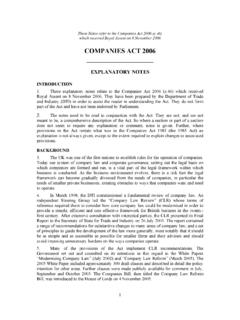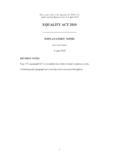Transcription of THIS GUIDANCE APPLIES FROM 10 MARCH 2014
1 Important Note: This is intended as general GUIDANCE only. It is not legal advice and must not be regarded as a definitive interpretation of the 1974 Act. Anyone in doubt should seek their own legal advice. This GUIDANCE APPLIES from 28 November 2020 GUIDANCE on the Rehabilitation of Offenders Act 1974 and The Exceptions Order 1975 Contents: (1) INTRODUCTION: What is the Rehabilitation of Offenders Act 1974? Who benefits from the 1974 Act and how? Which parts of the UK does the 1974 Act apply to? Does the Act apply to Service personnel? Does the 1974 Act cover cautions, penalty notices for disorder or fixed penalty notices? (2) REHABILITATION PERIODS: How long will it take before my caution or conviction becomes spent? Are there any sentences which are not covered by the 1974 Act?
2 What are the rehabilitation periods for motoring offences? What happens if I get another caution or conviction before my first conviction becomes spent? What happens if I get another conditional caution or conviction before my first conditional caution becomes spent? I have been sentenced for more than one offence at the same time. Will the rehabilitation periods run concurrently or consecutively? (3) EXCEPTIONS ORDER: Are there any jobs or other activities for which I will have to disclose both spent and unspent cautions and convictions? What jobs and activities are listed in the Exceptions Order? Which cautions and convictions do I need to disclose under the Exceptions Order if full disclosure isn t required? What is a specified offence ? Can an employer ask an individual to declare details of all convictions and cautions?
3 Are there any jobs or activities where full disclosure is required? (4) INFORMATION FOR EMPLOYERS How do I know if I am eligible to request a standard or enhanced criminal records certificate from prospective and/or current employees? Important Note: This is intended as general GUIDANCE only. It is not legal advice and must not be regarded as a definitive interpretation of the 1974 Act. Anyone in doubt should seek their own legal advice. What should I consider when employing ex-offenders? (5) Jurisdiction Application of different rehabilitation periods and exceptions in England & Wales and Scotland What legislation to apply when the Disclosure and Barring Service and Disclosure Scotland issue criminal record certificates (6) ADDITIONAL INFORMATION Immigration and Nationality decisions. Does the 1974 Act apply to Immigration and Nationality decisions?
4 Visa Applications Do I have to disclose all my convictions for a visa application? Criminal Injuries Compensation Scheme (CICS): I have an unspent conviction. Does this affect my eligibility for claiming compensation from the Criminal Injuries Compensation Scheme? Notification and Disclosure Schemes Is the 1974 Act linked to the Violent and Sex Offenders Register? ANNEX A: Examples of the types of occupations, posts and activities in the Rehabilitation of Offenders Act 1974 (Exceptions) Order 1975 . Important Note: This is intended as general GUIDANCE only. It is not legal advice and must not be regarded as a definitive interpretation of the 1974 Act. Anyone in doubt should seek their own legal advice. (1) INTRODUCTION: This document should be considered a guide to the position in England and Wales only.
5 You will find links to more detailed GUIDANCE on specific issues throughout, including references to GUIDANCE produced by the Disclosure and Barring Service (formerly the Criminal Records Bureau (CRB)) about eligibility for standard and enhanced criminal records certificates. What is the Rehabilitation of Offenders Act 1974? The Rehabilitation of Offenders Act 1974 ( 1974 Act ) primarily exists to support the rehabilitation into employment of reformed offenders who have stayed on the right side of the law. Under the 1974 Act, following a specified period of time which varies according to the disposal administered or sentence passed, cautions and convictions (except those resulting in prison sentences of over four years and all public protection sentences*) may become spent. As a result the offender is regarded as rehabilitated.
6 For most purposes the 1974 Act treats a rehabilitated person as if he or she had never committed, or been charged with charged or prosecuted for or convicted of or sentenced for the offence and, as such, they are not required to declare their spent caution(s) or conviction(s), for example, when applying for most jobs or insurance, some educational courses and housing applications. *A public protection sentence, the provisions for which are set out in Part 12 of the Criminal Justice Act 2003 and Part 8 of the Armed Forces Act 2006, means a sentence of imprisonment or detention imposed for specified sexual and violent offences. These sentences include imprisonment or detention for public protection, extended sentences of imprisonment or detention for public protection, and extended determinate sentences.
7 Who benefits from the 1974 Act and how? All cautions and convictions may eventually become spent, with the exception of prison sentences, or sentences of detention for young offenders, of over four years and all public protection sentences regardless of the length of sentence. Once a caution or conviction has become spent under the 1974 Act, a person does not have to reveal it or admit its existence in most circumstances. Unless an exception APPLIES (see below), then spent cautions and convictions need not be disclosed when filling in a form, or at a job interview. An employer cannot refuse to employ someone (or dismiss someone) because he or she has a spent caution or conviction unless an exception APPLIES . The exceptions where you may have to declare spent cautions and convictions are listed in the Rehabilitation of Offenders Act 1974 (Exceptions) Order 1975 (see Section 3 of this GUIDANCE ).
8 An employer should be able to say if an exception APPLIES and, if so, where it can be found on the Exceptions Order. Which parts of the UK does the 1974 Act apply to? The 1974 Act APPLIES in England, Wales and Scotland. However there are some differences in the way in which it, and related legislation , operates in Scotland. This document should therefore be considered a guide to England and Wales only. Important Note: This is intended as general GUIDANCE only. It is not legal advice and must not be regarded as a definitive interpretation of the 1974 Act. Anyone in doubt should seek their own legal advice. For information on the 1974 Act in Scotland, please visit: The relevant Northern Irish legislation , the Rehabilitation of Offenders (Northern Ireland) Order 1978 and the Rehabilitation of Offenders (Exceptions) Order (Northern Ireland) 1979 can be found here: Does the Act apply to Service personnel?
9 The Act APPLIES to everyone convicted of a criminal offence or a service disciplinary offence (for example absence without leave) by either a civilian court (in the cases of criminal offences) or a Service Court or the Commanding Officer (in the cases of criminal or Service disciplinary offences). The same rehabilitation periods apply to sentences which are imposed in the service justice system as are imposed by the civilian justice system (for example a fine imposed by a Magistrates Court and a fine imposed by a Court Martial, would each have the same rehabilitation period of a year beginning with the date of conviction). Additionally there are two sentences which attract a rehabilitation period and which can only be imposed by the service justice system; removal from the service (for example dismissal with disgrace from Her Majesty s service or dismissal from Her Majesty s service) which attracts a rehabilitation period of 1 year beginning with the date of conviction; and a sentence of service detention, the total rehabilitation period being the period of the sentence and an additional buffer period of 1 year which APPLIES from the end of the sentence (see the section below on rehabilitation periods).
10 These rehabilitation periods are halved if the offender was under 18 at the time of conviction. All of the other sentences particular to the service justice system (for example a severe reprimand or a service supervision and punishment order) that are not listed elsewhere in the GUIDANCE are spent immediately. Does the 1974 Act cover cautions, penalty notices for disorder or fixed penalty notices? The 1974 Act covers simple cautions (which become spent immediately) and conditional cautions (which become spent after three months). Reprimands and warnings were abolished in April 2013 and a reprimand or warning given before that date is now to be treated as a youth caution which, as with adult cautions, is spent immediately. Fixed Penalty Notices and Penalty Notices for Disorder do not constitute a conviction or caution (though they may be recorded on local police systems should the force consider it necessary to do so) and they therefore are not covered by the 1974 Act (but see below in relation to a FPN issued for certain road traffic offences and where an endorsement is imposed).
















